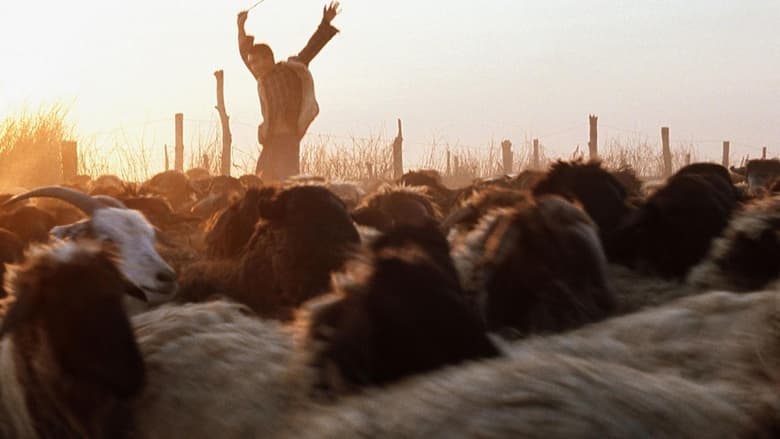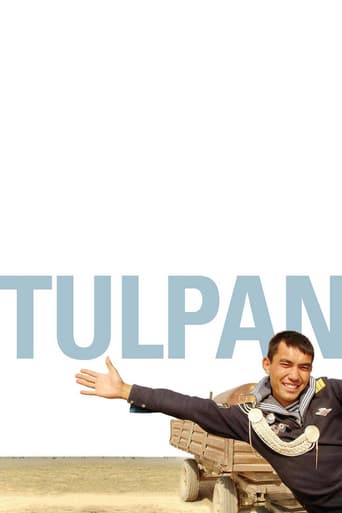Asa, a young and cheerful dreamer, returns from his Russian naval service to his sister’s nomadic family on the desolate Hunger Steppe of central Asia, so that he can begin his own life as a shepherd. But before he can tend a flock of his own, Asa must first win the hand of the only eligible girl for miles—his mysterious neighbor, Tulpan.
Reviews
One of my all time favorites.
How sad is this?
The movie turns out to be a little better than the average. Starting from a romantic formula often seen in the cinema, it ends in the most predictable (and somewhat bland) way.
One of the most extraordinary films you will see this year. Take that as you want.
...........................................................from Pasto,Colombia...Via: L.A. CA., CALI, COLOMBIA....and ORLANDO, FL *** This review may contain spoilers ***If you don't know what TULPAN means in English, you will after watching the film. And yet, they never translate it for you...You have to figure it out for yourself! Sometimes, unfortunately, it seems that particular talent is fast becoming a lost art among U.S. movie-goers. Take a film like TULPAN, which is so simple, so unpretentious, and yet, manages to show us things in life that are so delicate and complicated! ***May Contain a Minor Spoiler or Two!*** What motivated me to give TULPAN a look? Certainly not the IMDb Blurb, it really misses the mark! No, my decision was based on a truly accurate, quality review. Originality is something to be prized and praised in a movie. You know how rare it is to encounter a film with something totally original to offer. TULPAN has at least 5 elements that I don't recall seeing in any other cinematic work! Without them, 6 or 7* more than likely would have been my rating...But I'll add 1/2* for each original element, bringing my rating up to 9*. So, What are these elements? 1) ALL the actors in TULPAN appear using their REAL names! Maybe you're thinking you've seen a few other films like that. Well, in ALL the others I remember like this, the production values are horrific and the acting worse. Here the acting is so natural, so oblivious to the camera, it lends a "Slice of life" feel to the production.2) Have seen movies in dozens of different languages! Kazak is not one of them. So, TULPAN is my first in this language related to Turkish.3)Have you ever seen mouth-to-mouth respiration administered to a newborn calf in a movie? Not just once, but several times by two different actors! Elements 4) and 5)....? Let's keep the last two elements a surprise. (Although my alternate title above should give you a hint.) Sheep-herding on the Asian Steppe is anything but exciting. TULPAN REALLY drives that point home. If you're not willing to sit through movies where the pacing is, at times, excruciatingly deliberate, but that reward you in the end for your patience...This is not for you. If you like windows into new and exotic cultures, check TULPAN out! 9* STARS*.....ENJOY/DISFRUTELA! Any comments, questions or observations, in English or Español, are most welcome!
The life on the Kazakh steppe must be one of the hardest in the world, at least if its depiction in this film is anything to go by: a world of arid plains, dust storms, and post-Soviet motorised transport that moves no faster than a camel can walk. 'Tulpan' provides a heart-felt depiction of this life (one really feels one understands the people's love for the animals on which they depend after watching it); but is also full of sly, silly comedy, the story of a sailor who dreamed of becoming a shepherd. However, there's not much dialogue, and at times it could have done with a faster pace. But it's a nice insight into a world away from that which most of us live in.
I had no idea what to expect from "Tulpan". I can't recall where in my movie trolling I'd decided to rent and watch it. Would it be one of those small, eccentric films with a quirky character in the lead? Those can work but I've been a little leery of them lately. The writer/director, Sergei Dvortsevoy, who is 47, is from Kazakhstan where Tulpan is set and has been involved in a half dozen films as writer and director. But I enjoy Russian cinema and Kazakhstan was once part of the Soviet Union so maybe Kazakhstan is the world's largest landlocked country although it does border on the Caspian and Aral Seas. The steppe where the film takes place is the largest dry steppe region in the world and the film offers dramatic vistas of this flat, flat plain where people have lived as nomadic herders for centuries and continue to raise sheep, goats, camels in one of the least densely populated regions on earth.Asa, the main character, has come home from his duties as a sailor in the navy. He hopes to arrange a marriage for himself with the help of his sister and brother-in-law with a local girl he's never met, Tulpan. There is much delicious dry humor in this set up. Asa hopes to set himself up as nomad, living his life in his yurt, scratching out an existence from the hard-scrabble land. The film beautifully portrays for us in almost documentary fashion the life Asa hopes to achieve.His sister's family is lovingly presented. His sister is beautiful and loves her daughter whose constant singing irritates the stern, hard working father, and her young son who gallops about pretending the stick he is straddling is like the horse his father rides. But the authenticity of the life presented here is documentary like and I mean that in the best possible way. The young boy appears to not to be aware of the camera at all as do all of the actors, camels included. So what we see seems a very authentic look at a fragile way of life.And therein lies another of the beauties of "Tulpan". As the attempt at arranging the marriage runs into roadblock after roadblock, we see how much Asa loves that existence. His brother-in-law wonders why Asa would choose such a difficult existence, given the choice. But Dvortsevoy, while showing the daily life and death struggles a herdsman must endure, is also able to demonstrate why someone would do whatever to live a rich life in such a beautiful yet primitive place.I can't recommend "Tulpan" highly enough. See it if you can. I have a feeling what has been captured here will not be around for much longer.
Another film from Kazakhstan, but unlike the NYFF's 'Chouga,' far from being set in the newly rich urban part of the country. Dvortsevoy, a successful documentary filmmaker, chose to make this, his first feature, in the ethnographic mode, among shepherds in the Betpak Dala, the steppe, a region of scrubby grass, dirt, flatland, whirling wind storms and stormy skies. The technique is to work in near-wilderness, among non-actors, with nothing but camels or donkeys or rugged trucks to travel by, surrounded by a herd of sheep and a few goats, living in a yurt. The method and setting resemble those of Dava and Falorni's 'The Weeping Camel,' but the focus this time is not as anecdotal and the story raises fewer troubling questions. It's still not certain that the effect of "authenticity" means the events we're witnessing truthfully depict life in the steppe. But the sense of trying to adapt to a harsh environment and culture is powerful and the landscape is awesome, and the sheep births we witness are unquestionably real.The protagonist is Asa (Askat Kuchinchirekov). He is a young sailor who's just finished his military service who comes out to the "Hunger Steppe" to live with the family of his sister Samal (Samal Eslyamova), headed by her husband, an older man, Ondas (Ondasyn Besikasov). Sailors draw their dreams under the lapels of their uniforms and Asa's sketch shows the plain with a yurt, children, camels, and the sun shining. Apparently he is from somewhere else (it's not clear how his sister got to be Ondas' wife) but he doesn't want city life, he wants to make his paradise out here. He dreams of prospering as a shepherd, doing so well he can buy solar panels to put on his yurt so he can have electricity. His pal is the nutty Boni (Tulepbergen Baisakalov), a transport driver whose truck is plastered with magazine photos of nude babes and who plays loud pop music as he drives madly across the plain. It's Boni who first brings Asa to the yurt of Ondas and who dreams and schemes with him.Driven by Boni, Ondas takes Asa more than once a day's ride to a family who have an eligible daughter, the beautiful Tulpan (Tulip), whom the suitor only glimpses. She watches behind a screen. At these interviews Asa has an unfortunate tendency to dwell on a story about how he successfully fought an octopus. It doesn't seem to go over with Tulpan's aged dad (Amangeldi Nurzhanbayev ) or her mother (Tazhyban Kalykulova), who apparently has listened with a sympathetic ear to her desire to go off to college. Tulpan says she doesn't care for Asa, anyway, says his ears are too big. End of story. Ondas says that if Asa gets a wife, he can have a flock of his own, and only then. But there are no other women around. Tulpan becomes little more than Asa's dream, like the idyllic yurt and flock and prosperity and happy life. What can Asa do? Well, he can find a lost pregnant sheep and assist in its giving birth to a healthy lamb. But he still is very ambivalent about whether he wants to stay and face Ondas' disapproval or strike out for Sakhalin island as Boni wants or go to the capital, Astana, where there are probably jobs--and eligible women. But what stands out in 'Tulpan' is Asa's dream--the little picture under the collar of his sailor jacket that seems to draw him back every time he packs up his little valise and starts to go away.Dvortsevoy populates his landscape and the yurt with noisy characters to break the sounds of silence and the roaring winds. Samal and her daughter Nika love to sing at the top of their lungs, with sometimes pleasing, sometimes grating effect. Beke is a little boy with a great memory who listens to the radio broadcasts in Russian and can recite the national and global and cultural news verbatim on Ondas' command. Ondas himself is often barking out harsh commands. There is the smallest boy, who runs around chirping and laughing all the time riding a wooden stick, an indomitable spirit and perhaps potentially as nutty as Boni. The omnipresent sheep of Ondas' flock seem to be too often growing weak and dying. A vet (Esentai Tulendiev) has to come in with Ondas' boss to assess the cause: he decrees that the animals are not sick (or poisoned by chemical waste like the ones in the Naples region), buy just hungry. The yurt has to be moved to better grazing land.This is an Arte co-production. It's not a great film by any means; it's technical aspects are minimal. But some will be impressed by its vividness. Asa is a winsome character and there are moments when the wind and the sky create a wild poetry. The sheep, in all their noise and disorder, fill the screen powerfully too. This may have been designed to be seen on television but it is powerful on a big screen.The film won the Un Certain Regard Prize--Groupama Gan Foundation for Cinema, 2008, and is part of the NYFF.
Top Streaming Movies
















